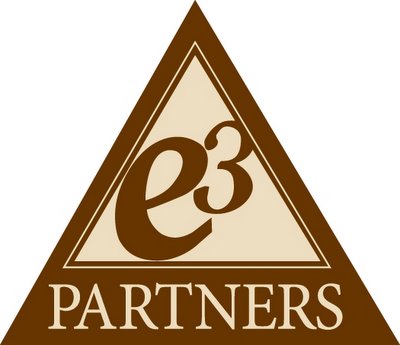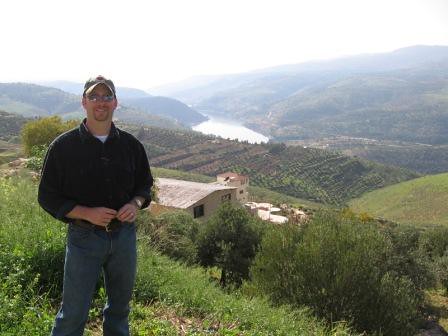Sudan in December
It's midnight and you're riding back from the airport in Nairobi for the third time. You still don't have your bag. The bag with your water purifier, malaria meds, clean underwear; you know, seemingly important stuff. Your plane leaves at 9 a.m., the same time the next flight from London lands, potentially with your bag. What do you do? Stay or go ...
Four hours later at 4 a.m. I woke up and considered what was in front of me. My main concern was clean water. I wasn't sure what the water situation would be in the two "towns" (villages, really) that David Kaya and I were flying to. We'd be flown in, dropped off, and left until the scheduled pick up. As an aside, the ministry that flew us, AIMAIR, is absolutely top notch and indispensible for ministry in Southern Sudan where there are very few roads.
I was a bit nervous. Add to this a feeling of being completely overwhelmed by the church situation in Southern Sudan. A situation David and I had spent a good bit of time discussing. We talked about not only how to plant a church or two in a few villages, but how to build a sustaining church network that would be healthy and strong over time. I was, and am still, feeling supremely unqualified for this task God has called me to. And that's not false modesty, it's fact. There is no sheepskin hanging in my office certifying that I have any idea how to do this large of a task. But I am a warm body who has an intense love for these people in Southern Sudan, and as my last Sunday School teacher (hat tip Reed) used to say, "[as believers] we have an unfair advantage." My anxiety level lying in that bed in Nairobi was really high. As I prayed two verses "popped" in my head: "Do not worry then, saying, 'What will we eat?' or 'What will we drink?' or 'What will we wear for clothing.'(Matthew 6:31); the second verse was, "faith, if it has no works, is dead." (James 2:17) Seems fairly clear, don't you think?
I got up, called Ali completely disrupting her entire day because the kids began to wail, and then I stepped on the faith roller coaster that's becoming more and more addictive to ride. Now hear how faithful our Lord is, how merciful He is to not just meet our needs, but to do more than we could possibly imagine.
Later that morning David gave me a pair of socks and my taxi driver gave me about five clean shirts. He's a great driver. If you're ever in Nairobi... I picked up a toothbrush and some toothpaste, stuffed 4.5 liters of water into my backpack and drove to the airport to proceed into Sudan.
At the airport we met James. He's a Sudanese pastor heading up ALARM's work in Lietnom (sounds like Vietnom with an "L"). This was the first half of our trip's mission: To see for ourselves what ALARM was doing in Sudan and create an official partnership between e3 and ALARM. You may recall that ALARM is a ministry that focuses quite a bit on reconciliation and trauma counseling. Two things in huge need in a country that not only has seen almost constant war, but a big need amongst the tribal people who operate on a system of revenge for even minor slights.
Because our Cessna couldn't carry all of us from Lokichoggio to Lietnom and back without refueling, we made a pit stop on the way in Akot. This is a village I visited in August. After arriving in Lietnom, we took took a tour of ALARM's facilities, listened to James' vision, then sat in his house with a local pastor for hot chocolate. Yes, hot chocolate. Yes, it was 85 degrees.
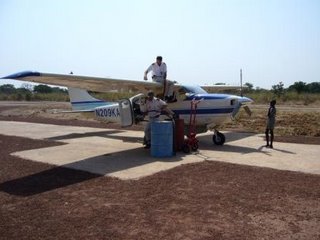
 Refueling.
Refueling. ALARM's training center in Lietnom.
ALARM's training center in Lietnom. David and James (right) greeting folks in town.
David and James (right) greeting folks in town. Abraham and James
Abraham and JamesJames and Abraham have a heart for planting churches. He told us that he had already seen the EvangeCube and one evangelist used it extensively in over 30 villages. We shared approaches to church planting and ended up agreeing to partner. David will return to Lietnom in March to train 50 pastors in church planting and the EvangeCube.
I was struck by one of James's questions to David and me: How do we build a self-sustaining church network? James elaborated with the story of western missionaries coming to Sudan and creating a system of dependency. Once they left, the church would collapse. This is a profound question in a developing country where foriegn aid supplements so much activity, and one that encouraged me greatly. A window for church planting is open in Southern Sudan, but it is one that could close any day. We have to create a church that is totally self sufficient. This in a country where in most villages there is virtually no economy. Do you see what I mean about not feeling qualified. (Help Lord!)
Video of James talking about the window of opportunity in Sudan.
While in Lietnom, I stayed at a Non-governmental Organization (NGO) camp. David and I shared a Tukel, the round, mud and thatch huts. The NGO had clean water and good food. Now what was I worried about before?
 My hotel room, the building behind it had about five roosters. I rose early.
My hotel room, the building behind it had about five roosters. I rose early.From Lietnom, we flew to Kapoeta. We were really praying because at this point we were walking by faith. I had found a place for us to stay and I had a list of names of people to try to find. One name from the IMB missionary and a set of names that my Didinga friend in Dallas provided. That's it, that was our plan in its entirety. Once we landed, a camp manager, Jonas, picked us up and confirmed what we had been told earlier: we'd only have a vehicle capable of driving around town. There were no 4x4s that could make it on the roads leaving the town. We made arrangements to visit the two churches in town Jonas knew about. We registered with the local government who informed me that I was not allowed to take any photographs outside of the camp or the churches. They were still tense because of insecurity, and David told me if I took photos it might get complicated. I asked him to define complicated. He told me I'd see the inside of the jail. I was convinced and pocketed my camera. No one yet recognized a single name I had written down. I found out later they were all in another town that we could not get to. Now it gets good.
Just a quick note on the camp. We stayed in a nice, big tent on the owner's personal property. That meant we had nice shower, cho (bathroom), and three hot meals a day. The camp ringed the owner's main business: digging water wells. Suffice to say, clean water was not a problem. What was I worried about again?
 Water drilling rig.
Water drilling rig.
Our room at the camp.
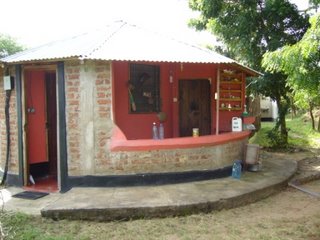
Jonas dropped David and I off at the church. We walked into the compound and quickly met an evangelist. He guided us over to a set of white plastic lawn chairs in the shade where two other pastors greeted us. When we sat down, suddenly a man came over and shouted, in friendly way, towards David. They were from the same clan and had grown up together in the same refugee camp in Uganda. Instant contact, instant credibility.
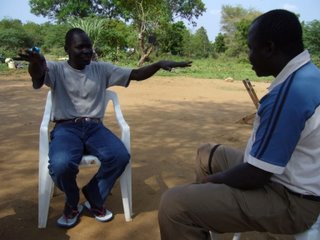 David's friend and fellow clan member. His name is David also.
David's friend and fellow clan member. His name is David also.This is getting long, so I'm going to cut right to the point. This group of pastors represented the main towns and villages we want to reach in this region of Sudan. In about two hours, we sealed an agreement to train roughly 150 pastors and church leaders this March. In just over those same two hours, the Lord opened up the entire southeast portion of this country to e3. These were solid guys, strong pastors and leaders with a strong faith. They could identify the big problems in the tribes they worked with: cattle raiding, revenge, violence, animism, witch doctors and so forth. When I asked them what their top needs were, I was again surprised. They listed training for pastors and help tranforming the hearts of the people, particularly the tougher tribes with long, deep roots in cattle and cattle raids. No one asked for money, water, medicine, or food. And believe me, they need all that and a whole lot more. It's just that these guys appeared to have set their minds on the eternal. It's a humbling thing to be a part of.
 The pastors.
The pastors. Later a chaplain from the Army joined us. He'll bring five of his guys to David's training in March.
Later a chaplain from the Army joined us. He'll bring five of his guys to David's training in March. The African Inland Church (AIC) on the compound.
The African Inland Church (AIC) on the compound.David's reaction to the day in three videos.
Summary
God is soveriegn and He can be trusted in every way. While there was more time and work involved, essentially in two meetings, the Lord not only opened up the entire southeastern portion of Sudan to e3 and, we pray, many new churches, He set up David to train about 200 Sudanese this coming March. He also reminded me what I really need when we serve Him?
Him.
Thanks as always for your intercession and support. Ali and I and David and Gloria are eternally grateful.
A final note and prayer request for David. He had a rough week personally. His cousin, working in Australia, was beaten severely. After a week on life support, he died. The fifth and last son of his parents to die, all in their 20s. David is on track to become the leader of his sub clan, in most ways he already is. Please remember this family during a tough time emotionally for all of them.
Other Stuff
Video of a water well.
A song/prayer greeting
 Children in Lietnom
Children in Lietnom
 Driving on a back road at night we came across this woman. She's scooping water from the potholes so she'll have water for her family. How can I possibly comment on this? It's sort of stupifying and takes your words away. More feeling of inadequacy. The needs are indescribably great.
Driving on a back road at night we came across this woman. She's scooping water from the potholes so she'll have water for her family. How can I possibly comment on this? It's sort of stupifying and takes your words away. More feeling of inadequacy. The needs are indescribably great.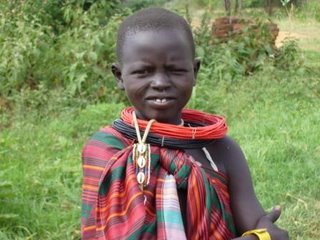 Toposa girl.
Toposa girl. More Toposa girls.
More Toposa girls. And a few more.
And a few more. The army used the church compound for their headquarters. Here a leftover.
The army used the church compound for their headquarters. Here a leftover.

